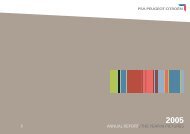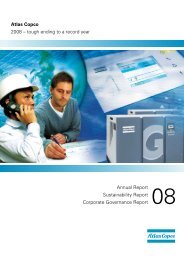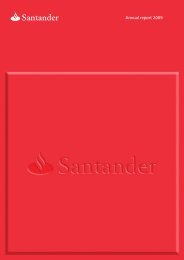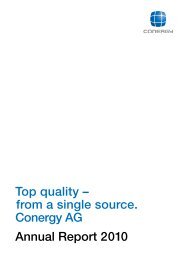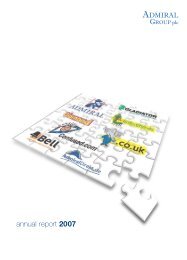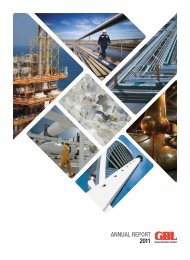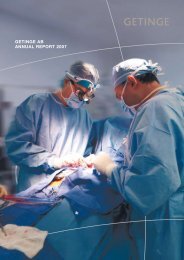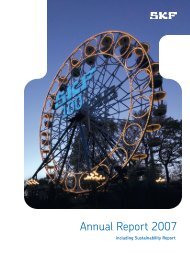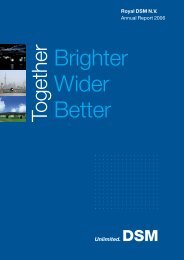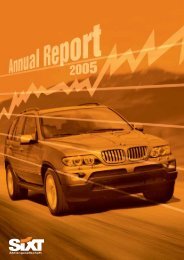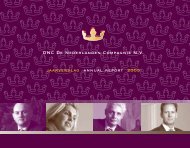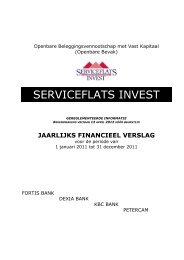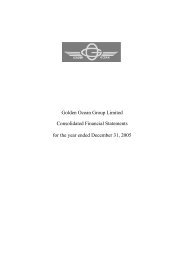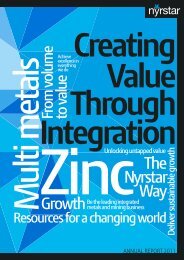BOC Report and accounts 2005 - Alle jaarverslagen
BOC Report and accounts 2005 - Alle jaarverslagen
BOC Report and accounts 2005 - Alle jaarverslagen
Create successful ePaper yourself
Turn your PDF publications into a flip-book with our unique Google optimized e-Paper software.
62 The <strong>BOC</strong> Group plc Annual report <strong>and</strong> <strong>accounts</strong> <strong>2005</strong> Financial review<br />
e) Foreign exchange.There are certain differences in the requirements of IAS 21 compared to UK GAAP in<br />
respect of functional currencies <strong>and</strong> in relation to the accounting for foreign exchange on loans between<br />
Group companies.This is an area where there may be increased volatility in the Group’s ongoing results on an<br />
IFRS basis compared to UK GAAP arising from exchange gains <strong>and</strong> losses.<br />
f) Financial instruments.The Group will adopt IAS 39 on 1 October <strong>2005</strong> in line with the exemption under IFRS 1.<br />
This st<strong>and</strong>ard impacts the accounting for a range of financial instruments <strong>and</strong> embedded derivatives.The<br />
Group has few financial instruments <strong>and</strong> they are predominantly related to managing currency <strong>and</strong> interest<br />
rate risk.The Group has reviewed its financial instruments <strong>and</strong> has concluded that at present they meet the<br />
requirements to enable it to apply hedge accounting. Embedded derivatives typically arise from escalation<br />
clauses in contracts with customers to recover cost increases.Whilst the impact is not material at 1 October<br />
<strong>2005</strong>,embedded derivatives may give rise to greater volatility in the Group’s earnings arising from marking to<br />
market the underlying derivative.<br />
The adoption of IFRS will also result in a number of changes to the presentation of the financial statements<br />
including disclosures. For example, the Group’s share of the post-tax profit arising in joint ventures <strong>and</strong> associates<br />
will be shown as one line in the income statement rather than as part of Group turnover, operating profit <strong>and</strong><br />
interest.There will be a number of other presentational changes including reclassifications within the balance sheet<br />
<strong>and</strong> a change to the layout of the cash flow statement.<br />
Overall, management believes that the impact of IFRS on earnings <strong>and</strong> net assets will be broadly neutral<br />
subject to the effects of IAS 21 <strong>and</strong> IAS 39 as noted above. Cashflows <strong>and</strong> the underlying economics of the<br />
business will not change.<br />
US GAAP<br />
The financial statements of the Group have been prepared in accordance with UK GAAP, which differs in certain<br />
respects from US GAAP.<br />
The US accounting information in note 30 to the financial statements gives a summary of the principal<br />
differences between the amounts determined in accordance with the Group’s accounting policies (based on UK<br />
GAAP) <strong>and</strong> amounts determined in accordance with US GAAP, together with the reconciliation of net profit<br />
<strong>and</strong> shareholders’ funds from a UK GAAP basis to a US GAAP basis <strong>and</strong> a movement in shareholders’ funds<br />
on a US GAAP basis.<br />
The net income for the year ended 30 September <strong>2005</strong> under US GAAP was £326.7 million (2004:<br />
£297.7 million, 2003: £264.3 million), compared with the net profit of £367.0 million in <strong>2005</strong> (2004: £264.0 million,<br />
2003: £219.1 million) under UK GAAP. Shareholders’ funds at 30 September <strong>2005</strong> under US GAAP were<br />
£2,122.2 million (2004: £1,920.1 million), compared with £1,942.0 million (2004: £1,675.3 million) under UK GAAP.<br />
The difference primarily results from the differing accounting treatment of pensions, goodwill, financial instruments,<br />
investments, fixed asset revaluations, deferred tax <strong>and</strong> variable interest entities.<br />
Related party transactions<br />
During the year, interest income of £13.8 million (2004: £7.3 million, 2003: £7.6 million) was received from the<br />
Cantarell joint venture in Mexico.<br />
During the year, the Group was invoiced £45.9 million in respect of purchases of production plants from<br />
Linde <strong>BOC</strong> Process Plants in the US.At 30 September <strong>2005</strong>, £1.9 million was payable in respect of these invoices.<br />
No material purchases were made in 2004 or 2003.<br />
The Group had no other material related party transactions that might reasonably be expected to<br />
influence decisions made by the users of these <strong>accounts</strong>.<br />
Exchange rates<br />
The majority of the Group’s operations are located outside the UK <strong>and</strong> operate in currencies other than sterling.<br />
The effects of fluctuations in the relationship between the various currencies are extremely complex <strong>and</strong><br />
variations in any particular direction may not have a consistent impact on the reported results. In terms of average<br />
rates for the year, in <strong>2005</strong> sterling strengthened against two of the four principal currencies affecting the Group:<br />
by three per cent against the US dollar <strong>and</strong> by two per cent against the Japanese yen. Sterling weakened by<br />
two per cent against the Australian dollar <strong>and</strong> by three per cent against the South African r<strong>and</strong>.<br />
In 2004, sterling strengthened against the US dollar <strong>and</strong> the Japanese yen. Sterling weakened against the<br />
Australian dollar <strong>and</strong> the South African r<strong>and</strong>.<br />
In 2003, sterling strengthened against the US dollar <strong>and</strong> the Japanese yen. Sterling weakened against the<br />
Australian dollar <strong>and</strong> the South African r<strong>and</strong>.



